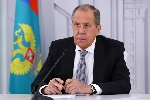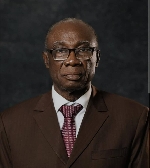E/R: Tackling ‘okada’ crashes – Role of NRSA
 Okada
Okada
Commercial motorbikes, popularly called 'okada', 'aboboyaa' or 'pragya', depending on their mold, have become an integral part of road transportation in Ghana, the Eastern Region inclusive.
Operations of motorbikes have become indispensable due to the extremely poor nature of roads that make the movement of four-wheel vehicles really difficult in most parts of the region. As a result, people in most communities rely on commercial motorbikes for all their socio-economic activities including farming, funerals, going to the market, offices and many other social gatherings.
Recently, Assembly Members were supplied motorbikes to facilitate their mobility to assembly sessions and deprived communities to enhance local governance. Reports gathered so far indicates that some of these Assembly Members have converted theirs into commercial motorbikes to generate income for themselves. Meanwhile, L.I. 2180 prohibits the use of motorbikes and tricycles for commercial operations in Ghana. Economic Importance
Apart from facilitating the movement of goods and people from one place to another, motorbikes are also a form of income-generation tool for people in the low-income bracket. For instance, 'aboboyaa' is useful in the carting of farm inputs to farms as well as carting produce from the farms to homes and market centres. Hitherto, most perishable farm produce got rotten on the farm due to transportation challenges as these farms are characterised by bushy paths and non-motorable roads, making the use of motorbikes crucial as they can traverse the rough terrains.
Apart from being used for funeral processions including conveying mourners and corpses from one village to another, motorbikes also serve as ambulances for pregnant women in labour and accident victims.
In fact, motorbikes and tricycles are used for commercial purposes - though illegally - in the full glare of law enforcement agencies for income generation ventures in small and big towns or cities. Elsewhere, Metropolitan, Municipal and District Assemblies (MMDAs) rely on the 'pragya', 'okada' and the 'aboboya' to boost their Internally Generated Funds (IGF) since they pay taxes or tolls.
The challenge
Despite the numerous benefits of motorbikes, the danger associated with their usage is quite enormous due to the vulnerability of riders and their passengers. Motorbikes compete with larger and fast-moving vehicles for road space, thereby increasing their risk factor. Observation of their operations has revealed that the riders are mostly minors or school dropouts whose only hope of survival is inextricably linked to the 'okada' business.
The National Road Safety Authority (NRSA) posit that majority of the riders have neither riding license nor any formal road safety training or education.
According to the Acting Regional NRSA Director, Mr Abdulai Bawa Ghamsah, these riders are often involved in the abuse of substances like tramadol, Indian hemp and alcohol among others adding that “this explains the high rate of crashes or fatalities they are involved in.”
The most worrying issue that arises with 'okada' operations on our roads is the increasing nonchalance towards road traffic regulations, thus, posing a grave danger not only to the riders but to other road users.
Available statistics from the Buildings and Roads Research Institute (BRRI) indicates that various motorbikes on the roads have contributed immensely to Ghana’s road traffic crashes.
It has become quite rare seeing patrons of 'Okada' taking protective precautions in the Eastern Region. It is common to see riders without crash helmets, engaging in overloading and flouting road traffic rules including jumping red lights.
In Koforidua, it is witnessed that almost all these motorbike riders do not pay heed to traffic signals, thus, being a big danger to pedestrians.
Statistics
In the Eastern Region, the total number of road traffic crashes recorded between January and August in 2018 was 769. A total of 722 crashes were recorded between the same period in 2019. Out of the number, in 2018, 303, making 39.4%, and in 2019, 196, representing 27.2% of them respectively were motorcycle related.
In an interview, the Regional Road Safety Director expressed surprise that even though the Bono and Ahafo Regions, as well as the Northern Regions, have the highest number of motorcycles in Ghana, they record lower accidents compared to the Eastern Region which has few motorcycles and yet records higher crashes.
He expressed that the statistics of motorcycle crashes in the Eastern Region was a source of worry and that his outfit was working to reducing crashes to the barest minimum.
“Even though the region’s statistics can be seen as not dangerously overwhelming, we cannot be confident of this outlook,” Mr Ghamsah assured.
Interventions
According to Mr Ghamsah, the NRSA is making efforts, in collaboration with the various Municipal and District Assemblies (MDAs), to organise, educate and sensitise motor riders on road traffic regulations.
“The Authority is liaising with the Driver and Vehicle Licensing Authority (DVLA) and the Motor Transport and Traffic Department (MTTD) to register and license motor riders in all districts in Eastern Region.
“Identifying the challenges met in the hands of the so-called 'goro boys' by these riders in the quest to register their motorbikes and get their riders license, we realised it was a reason that deterred them, since going through 'goro boys' increases one’s cost in registering and attaining a rider’s license,” he said.
Mr Ghamsah stressed that the motor riders would not incur additional cost in all these processes and that when this is done, the NRSA would then collaborate with the MTTD to work at getting the riders to adhere to motor traffic regulations to maintain “sanity on the roads.”
Conclusion
So far, over 78 motor riders including Assembly members have been provided with license ‘A’ and ‘E’ in the Nsawam Adoagyir Municipality. Arrangements have already been made for the next training session for riders in Upper Manya Krobo. All through the initiative of the NRSA.
In the face of consultations to whether or not legalise 'okada' or 'pragya' operations in Ghana, perhaps, the interventions being provided by the Eastern Regional NRSA is the way to go.
Writer’s email: [email protected]
Source: McAnthony Dagyenga
Trending Features

Russia–Africa:New horizons for old friends
09:23
Justice for sale: When poverty becomes a barrier to the Rule of Law
10:13
In defence of Act 794: Context, competitiveness and the real path to mining value
13:59
KGL's Resilience, impact in 2025 a remarkable benchmark for corporate Ghana
09:06
Is Ghana’s Special Prosecutor truly independent? Legal analysis raises key questions
14:39




